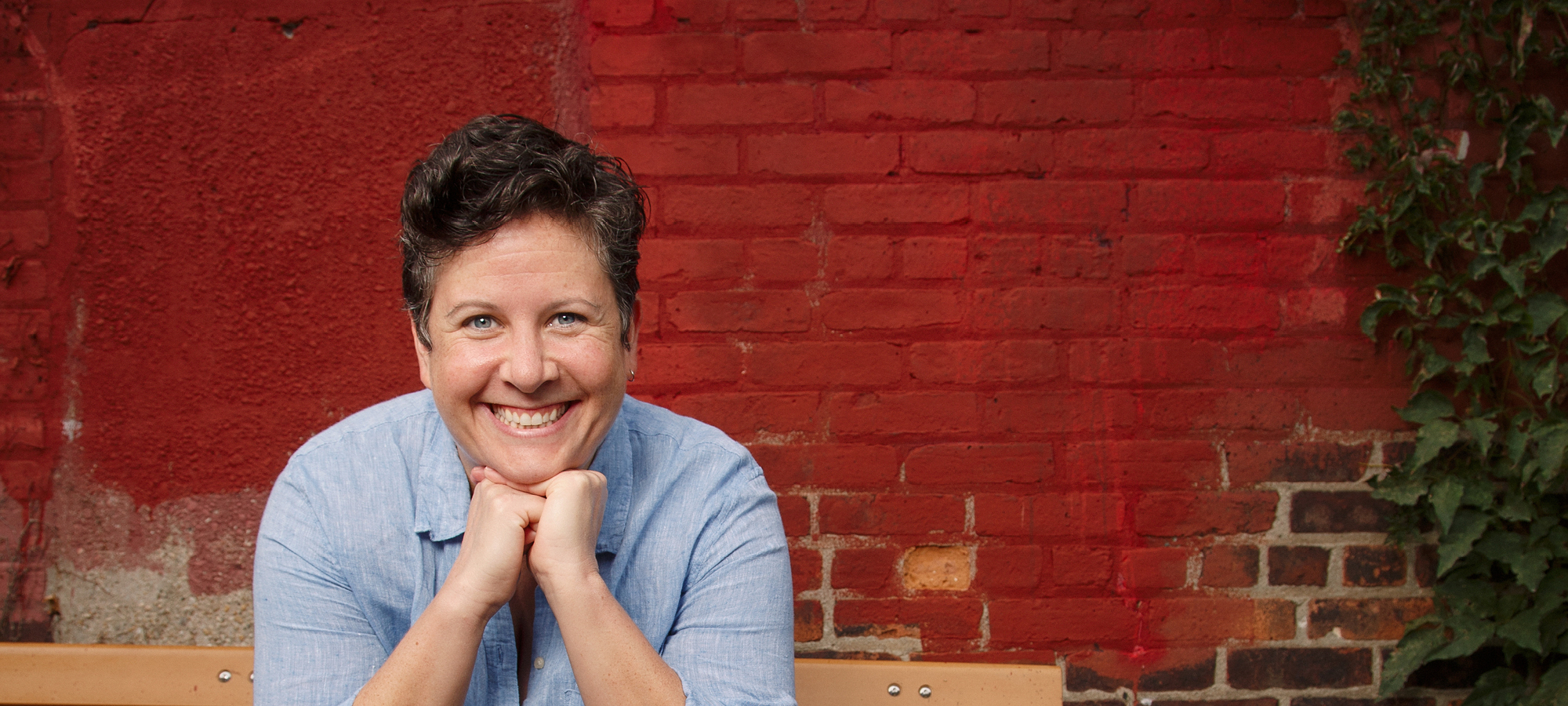
Onetime law professor Liz Glazer, JD’04, uses life’s trials as material for her stand-up comedy. (Photography by Mindy Tucker)
Attorney turned comedian Liz Glazer, JD’04, finds laughter in life’s highs and lows.
Stand-up comedian Liz Glazer, JD’04, doesn’t trust a funny person with a regular job. When the doctor performing her breast biopsy last year joked that she had trouble telling her left from right, Glazer laughed; she could relate. “And then,” Glazer says, “I’m thinking the person who was going to tell me if I have cancer in one of two breasts maybe shouldn’t lead with that relatable fact.”
She did not have cancer and went home with some new material.
Glazer, who used to be a funny person with a regular job, had no professional comedy aspirations when she completed a philosophy master’s degree at the University of Pennsylvania and enrolled at the Law School. After graduating in 2004, she practiced real estate law for almost two years at a New York firm but did not share the love for the work that she noticed in her colleagues.
An inquiry from the Hofstra University law school led her to academia. As a student Glazer had published a University of Chicago Law Review article on appropriations law, an accomplishment that earned an invitation to interview for a faculty position and, in time, to the tenure that she would give up in search of open mics.
Teaching, like practicing law, was “a good gig”—just not as good for Glazer as it seemed to be for those around her. But she wasn’t looking for an escape hatch into show business. She spent nine years at Hofstra, where laughter was known to emanate from her classroom.
In 2009, right in the middle of her professorial career, she took an improv class—a one-off, just for fun. Three years passed and then her former improv instructor invited her to try stand-up. On stage Glazer found the love she had never felt for her work in the law. An opportune buyout offer for tenured faculty compelled her to become an ex–law professor, a designation that still distinguishes her on the comedy circuit today.
“A Law Professor Switches to Stand-Up Comedy” read the headline on a Wall Street Journal profile in March. That publicity was just one piece of evidence of a thriving career. Glazer won the Boston Comedy Festival in December and the Ladies of Laughter competition in May, both performed on Zoom, as was her marriage to Rabbi Karen Perolman.
Sometimes Glazer thinks it’s no coincidence that her best year in comedy happened during a pandemic. She was already on an upward trajectory, “arguably”—a word that surfaces often, a vestigial tic of her former trade—bound for big things regardless. But adapting to COVID-19 limitations may have accelerated her ascent. Glazer stuck to her penchant for saying yes to unusual opportunities. It’s how she started doing stand-up in the first place.
Often with just minutes to inspire distant, unseen audiences to type “LOL” and crying-laughing emojis in the chat, she went all in on her idiosyncrasies. “Probably the things about me that are the most different or grabbing are: I’m gay, I’m married to a rabbi, I used to be a law professor, goodbye,” Glazer says, riffing on material she uses in her virtual sets.
Her sense of humor, on stage and off, always has revolved around the personal experiences preoccupying her at any given time. These days that includes “my wife’s and my efforts to get pregnant, and how my dad just died and my mom’s trying to find a good deal on a tombstone.”
The tombstone bargain hunting is no joke, but a real incident that provided fodder for many. After Glazer’s father died of heart disease in 2020, her mother thought she was being overcharged for a purportedly “jumbo” size tombstone, so she and her daughter went to the cemetery with a tape measure.
“I asked her, ‘Can we videotape this?’ She’s like, ‘Listen, that’s tacky,’” Glazer says. “And I’m like, ‘You’re the one who’s measuring every tombstone to get the best deal, and I’m the tacky one?’”
Her father would welcome his posthumous place in her act. “Use me in your materials,” he urged her in his heavy Latvian accent, and so she does.
An almost instantaneous mining of comedy from personal heartbreak or hardship characterizes Glazer’s act. She started writing jokes about her breast biopsy on the way home from the hospital.
Another time she was robbed at gunpoint and, within days, riffing on the experience onstage. “Getting mugged sucks,” she says, “but talking about it and creating comedy from it is great and empowering.”
Likewise, being gay was not always an easy aspect of her life, but now it’s a bit for her to come out to audiences. “We’re aware,” she imagines people responding, comfortable with the presumption.
Glazer’s success on stage proves—arguably—that she doesn’t need to identify herself with her former profession anymore either. She’s a comedian. People are aware.
